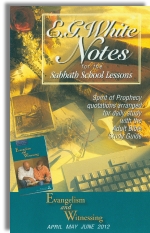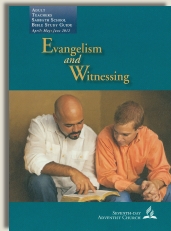|
||||||||||||||
Commentary on "Defining Evangelism and Witnessing"
Day 6: Thursday, April 5, 2012 - Our Job Description
Overview
Today’s lesson summarizes our witnessing “job description”. It uses 1 Peter 3:15 as the day’s Scripture text, and the lesson ends with a paragraph from EGW’s The Colporteur Ministry. The central theme of the lesson is that evangelism must follow a planned approach because God desires to reach the lost through His church. Nevertheless, one must be ready to tell his personal experience, and “the teaching of Jesus Christ and the influence of the Holy Spirit remain basic and crucial to all witnessing and evangelism.”
Observations
First of all, the text, 1 Peter 3:15, is lifted right out of the context of the sentence of which it is a part. The context, with today’s passage italicized, is:
[13] Now who is there to harm you if you are zealous for what is good? [14] But even if you should suffer for righteousness’ sake, you will be blessed. Have no fear of them, nor be troubled, [15] but in your hearts honor Christ the Lord as holy, always being prepared to make a defense to anyone who asks you for a reason for the hope that is in you; yet do it with gentleness and respect, [16] having a good conscience, so that, when you are slandered, those who revile your good behavior in Christ may be put to shame. [17] For it is better to suffer for doing good, if that should be God’s will, than for doing evil (1 Pet. 3:13-17).
In context, today’s text has nothing at all to do with the day’s lesson. The quarterly is teaching readers how to spread Adventism and gather people to “His church” which is actually “code” for “Seventh-day Adventism”. Adventism does not give its adherents biblical hope, which is the “hope” talked about in 1 Peter 3:15. Biblical hope is not a wish or a “maybe”; it’s an absolute certainty. The hope that is in the believer is salvation, the surety that having believed, we have crossed from death to life and will not come into judgment. This “hope” is a certainty! We cannot lose it.
Adventism’s “hope” is the chance that if everything goes right, they’ll be saved in the end. But that is no hope at all. It’s only a wish, and a wish that seems pretty far-fetched when examined closely.
Moreover, the passage in 1 Peter is not a “job description” for witnessing; it’s a passage to encourage believers to persevere under persecution. Adventists don’t want to think about persecution, even though they believe they will be the final objects of persecution. But the notion that “believing” means “persecution” is not part of Adventists picture of their role in today’s world.
Enduring persecution with joy and boldness makes no sense apart from being born again of the Spirit by believing in the Lord Jesus. Peter’s passage was written for believers who were born again, firmly hidden in Christ and absolutely confident of their salvation. This is the sort of person who can endure persecution without losing boldness or courage or joy.
The subject of evangelism and witnessing
This lesson implicitly teaches that witnessing and evangelism are to lead to bringing people into the Adventist church. There is no need for a “planned approach” otherwise. Moreover, the fact that the lesson has to state that “the teachings of Jesus Christ and the influence of the Holy Spirit remain basic and crucial to all witnessing and evangelism” reveals the underlying fact: Adventist evangelism is about gaining members.
In the Bible, witnessing and evangelism were always about Jesus dying for our sins, being buried, and rising from death on the third day. In Adventism, Jesus is the “loss leader”. They lead with Jesus and then, when they have the audience’s interest, they introduce the Adventist “family rules”, the “special knowledge” that makes Adventism God’s true remnant church.
The Bible, however, tells us that Jesus is EVERYTHING. We come to the cross completely empty-handed. There is nothing, not even Sabbath-keeping, that we do to show our devotion to Him. The only work He asks of us is to believe:
Jesus answered and said to them, “This is the work of God, that you believe in Him whom He has sent” (Jn. 6:29).
Telling people about Jesus, telling them that He has already paid in full for every sin they have ever or will ever commit, that believing in Him give them new birth and a new identity and a new citizenship in the kingdom of God’s beloved Son—this is the only evangelism we are ever asked to do.
Making disciples involves encouraging and studying with new believers to help them learn to live in submission to the Holy Spirit who sealed and indwelt them at the moment of their belief.
Judgment for the people of God happened at the cross. There is no ongoing investigation; there is no requirement for demonstrating loyalty to God. There is only belief in Jesus and honoring His command that we be baptized and celebrate the Lord’s Supper. And salvation does not depend even upon those two signs. Those are signs, like the wedding ring, that we do publicly to show the truth about our lives. But we are saved when we believe, not when we are baptized. If we are never baptized, we are still saved if we believe. And we can know that our sovereign God will keep His own and teach them and convict them as He matures them in Him.
There is no security or maturity apart from being born again. When we do submit ourselves to Jesus, though, and receive His righteousness as His covering for our natural unworthiness, He changes us. He does not give us stronger will-power; He gives us growing trust in Him. We learn to submit and let Him be God.
The irony of beginning a lesson on “witnessing” with an out-of-context verse that misses the point and ending with a long quote from EGW is not to be missed. Adventism witnessing is about Adventism. Period. Jesus is only a part of the message; the full message includes Sabbath, vegetarianism, and the “state of the dead”.
Biblical witnessing is about Jesus. Nothing else.
Summary
- The day’s text is not about defining witnessing; it is the central verse in a passage about suffering for the sake of Christ. It is about speaking the gospel boldly even if it divides.
- True witnessing is not about Adventism. It is about the Lord Jesus who died, was buried, and rose to life on the third day.
- Our job description is to believe in the One whom God has sent. That is the “work of God” (Jn. 6:29).
- True witnessing is not informed even slightly by an extra-biblical prophet. Scripture tells us all we need to know.
- Jesus is all we need. Trust Him.
Copyright 2012 BibleStudiesForAdventists.com. All rights reserved. Revised April 5, 2012. This website is published by Life Assurance Ministries, Camp Verde, Arizona, USA, the publisher of Proclamation! Magazine. Contact email: BibleStudiesForAdventists@gmail.com.
The Sabbath School Bible Study Guide and the corresponding E.G. White Notes are published by Pacific Press Publishing Association, which is owned and operated by the Seventh-day Adventist church. The current quarter's editions are pictured above.
Official Adventist Resources
Standard Edition Study Guide Week 1
Teacher's Edition Study Guide Week 1
Easy Reading Edition Study Guide Wk 1
Search the Complete Published Ellen G. White Writings
Please Support This Project


